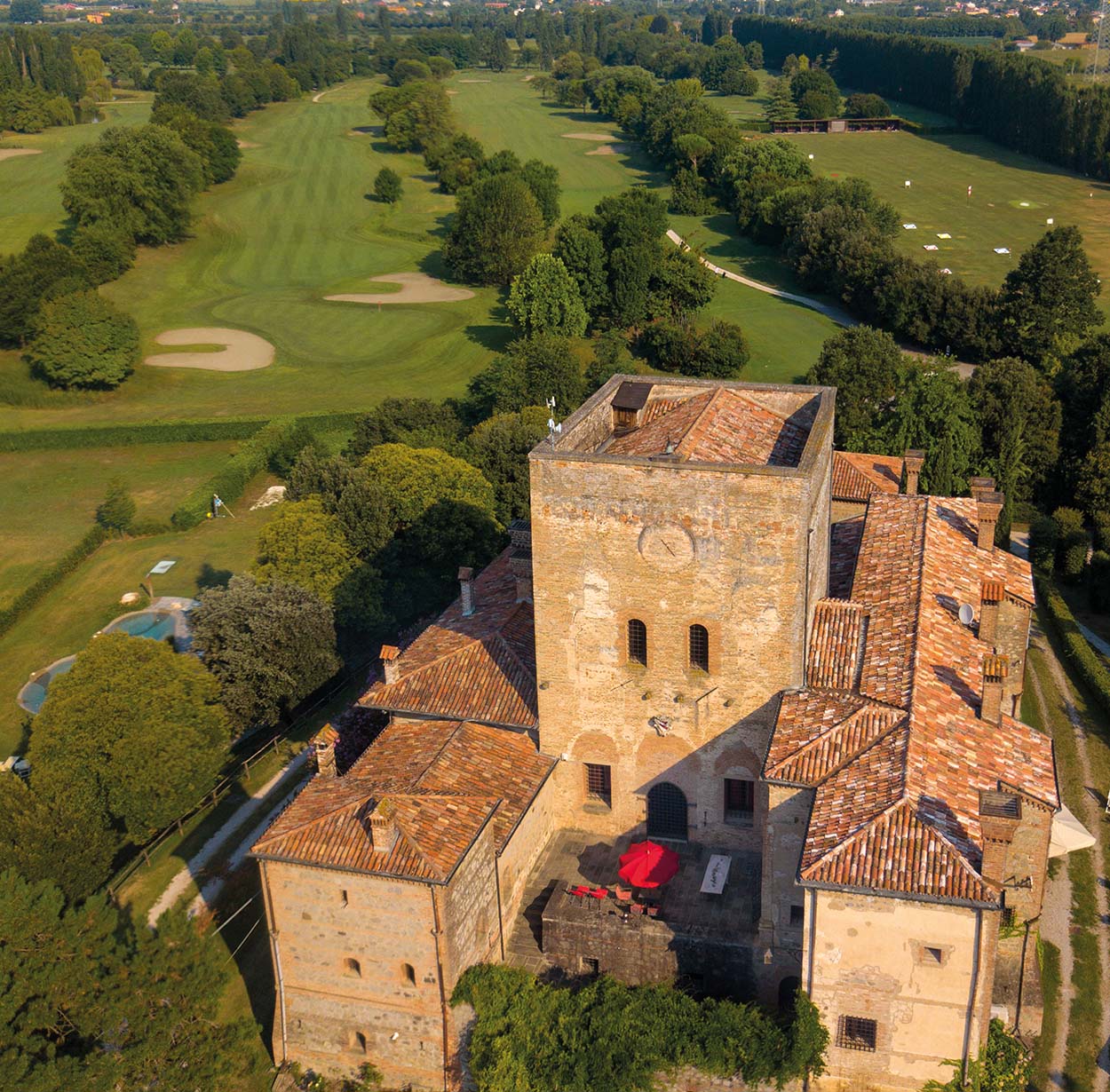
Montecchia Golf Club
The “IAGTO Sustainability Awards 2018” prize goes to the golf club where Mapesoil System was used.
Montecchia Golf Club, just a few kilometres from the city of Padua, was founded in 1988 and is a prestigious example of Italian excellence on the international golfing scene. The club is on the site of the property once owned by the Count Emo Capodilista family and includes an ancient castle, a splendid Renaissance villa and an old farm renowned for the quality of its great wines. The club house is an old building which was once used for drying tobacco, lovingly restored to its former splendour.
Montecchia Golf Club, just a few kilometres from the city of Padua, was founded in 1988 and is a prestigious example of Italian excellence on the international golfing scene. The club is on the site of the property once owned by the Count Emo Capodilista family and includes an ancient castle, a splendid Renaissance villa and an old farm renowned for the quality of its great wines. The club house is an old building which was once used for drying tobacco, lovingly restored to its former splendour.
The course has a total of 27 holes, designed by the British architect Tom McCauley (former President of the British Association of Golf Course Architects), and blends in perfectly with the area’s typical flat landscape punctuated by the undulating hills of the nearby Colli Euganei Regional Park. The design choices adopted in its construction have led to the creation of a technically challenging course, while at the same paying particular attention to a course management philosophy based on the natural surroundings and environmental sustainability, typical of the British approach to golf.
In fact, a golf club that implements a management policy based on environmental sustainability has numerous different functions: it represents an oasis that helps develop and safeguard the biodiversity and functionality of the surrounding ecosystem, it both buffers and stores drainage water, it helps conserve the local landscape, it provides vital green recreational areas within an urban context and it helps preserve natural and economic resources.
From when it was very first founded, Montecchia Golf Club has set an example for its concrete commitment to the preservation and development of natural resources, as testified by the various environmental awards received over the years: following its two “Impegnati nel verde (Green Commitment)” awards (in 2007 and 2012), in 2013 Montecchia Golf Club was granted the prestigious environmental certification GEO OnCourseTM, reconfirmed in 2018.
GEO certification represents an important achievement for any golf club and is considered to be a kind of environmental summary of a club. It is awarded by the non-profit body Golf Environment Organization (GEO) which, in collaboration with various government bodies, environmental groups and the academic world, promotes and develops the concept of environmental sustainability of golf courses. Each club in the list of candidates for this severe environmental certification must demonstrate that it complies with a series of requirements, all of which are then checked by a group of nominated inspectors, that is, that they really do adopt a system of sustainable management which encompasses the surrounding landscape and ecosystems, energy and resources, water, materials and the supply chain, environmental quality and the local community.
The virtuous management policy adopted by the Montecchia Golf Club resulted in yet another prestigious award in 2017, with the Club receiving the “IAGTO SUSTAINABILITY AWARDS 2018” prize during a ceremony held in Cannes in December 2017.
This award is from IAGTO (the International Association of Golf Tour Operators) as recognition of the excellence of golf clubs from all around the world for their commitment to environmental and social responsibility.
Amongst the most significant initiatives implemented by Montecchia Golf Club, and which have played a major role in obtaining this important result, is undoubtedly the “BIOGOLF” project, the first and, until now, the only one in Italy to have adopted a biological approach to golf course management. The project was implemented on the 9-hole “Yellow Course” and involves an approach to maintenance based on respect for biological agriculture protocols. Numerous Italian golf courses are profiting from the experience gained by Montecchia Golf Club, such as the conservation of the Bermuda grass tees and fairways, a solution that has enabled water and fertiliser consumption to be drastically reduced and the use of pesticides to be completely eliminated.
Many other tests are also currently being carried out in the same spirit and are making progress thanks also to the collaboration of the Grass Surfaces section of the Italian Golf Federation, the Universities of Padua, Bologna, Pisa and Turin, GEO, and the main Italian environmental organisations (Legambiente, Federparchi and Fondazione Univerde).
One of the most interesting of these initiatives is the maintenance of bunkers, that is, the pockets of sand dotted around golf courses that form obstacles during normal play. Since these areas do not have a grassy top surface, it is impossible to keep infestations in check with pesticides and keep the sand clean, which has quite an effect on the game itself and makes maintenance work particularly expensive.
MAPESOIL TECHNOLOGY
For this particular problem, under the supervision of the Superintendent, the Mapei Research & Development laboratory has developed a system to improve drainage based on MAPESOIL GF technology. This system has been specifically developed to increase the speed at which water flows away from surfaces and, at the same time, maintain the characteristics of the layer of sand, thereby reducing maintenance costs for the club.
The system involves the installation of a highly permeable blanket of MAPESOIL GF over the entire surface of the bunker, made from a mixture of gravel and a high-performance cementitious binder, which leads to a high level of volumetric stability, good mechanical properties and durability. This mixture is usually applied over a “flow-layer” made either from waterproofing sheets or by stabilising the soil with MAPESOIL 50, if unstable.
The high porosity of the MAPESOIL GF mix allows water to run off more quickly following a vertical direction if there is a sudden rainfall, thereby reducing the risk of the sand being leached and reducing maintenance costs to restore the bunker to its original condition. Also, the presence of a flow-layer below the permeable MAPESOIL GF surface drives all the water (both rainwater and irrigation water) towards the central collection point, so that the club can eventually recycle the water and use it for irrigation purposes.
Upgrading of the bunker area is completed by spreading on a top layer in variable thicknesses of clean, calibrated VG SPORT SU 2 silica sand by Vaga Srl, which is compliant with the requirements of the USGA (United States Golf Association) adopted all around the world.
Vaga Srl, a subsidiary of the Mapei Group, in compliance with the specific requirements of all those operating in the landscaping sector, also offers a complete range of graded, calibrated aggregates, VAGA SPORT, certified for the construction and maintenance of grass playing surfaces, the key element in the game of golf.
Once again, choosing quality construction materials and cutting-edge, sustainable solutions, such as those offered by Mapei and Vaga, has been rewarded.
For further information on Polyglass and VAGA products, see www.polyglass.com and www.vagaedilizia.it

















